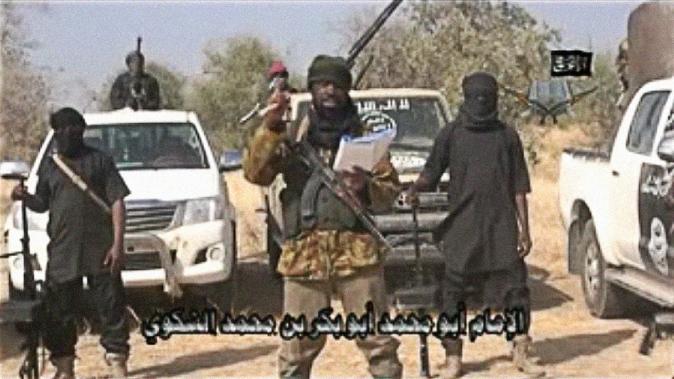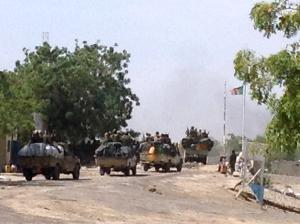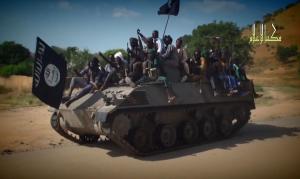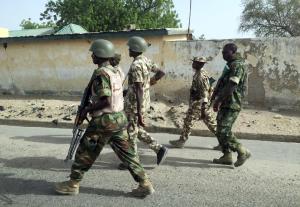Maiduguri (Nigeria) (AFP) - Boko Haram militants killed 11 people in an attack on Gamboru in northeast Nigeria after the Islamists reportedly slaughtered dozens of women in nearby Bama, witnesses said Thursday.
Troops from Chad were credited last month with liberating Gamboru in Borno state from Boko Haram control but Chad's withdrawal from Nigeria last week appeared to have left the town exposed.The latest violence underscored the challenges facing Nigeria as it heads towards March 28 general elections.
Despite claims of major victories over the Islamist rebels thanks to a joint offensive involving Chad, Cameroon and Niger, the threat posed by Boko Haram remains severe.
The insurgents have been resilient in the past and doubts persist over whether the regional offensive will prove capable of ending the violence.
- 'Back in Gamboru' -
Residents of Fotokol, a town in Cameroon but effectively attached to Gamboru, said the rebel onslaught began on Wednesday and there were indications that Boko Haram intended to occupy Gamboru again.
"Boko Haram gunmen returned on motorcycles to Gamboru yesterday (Wednesday)... and shot dead eight people," said Mudi Dankaka in an account supported by others.
Three more people were killed on Thursday, he added.
About 2,500 Chadian troops withdrew from Nigerian territory last week, with indications they would be redeployed for fresh offensives elsewhere, military sources in northern Cameroon told AFP.
Chadian troops last month escorted residents of Gamboru back into the town from Fotokol across the 300-metre (yard) bridge that forms the border.
One resident described Gamboru as "a ghost town strewn with burnt vehicles, destroyed buildings and emptied homes".
"Boko Haram are back in Gamboru," said Fotokol resident Umar Ari on Thursday.
Ari and others noted that Nigerian forces had not been spotted in the area, leaving Gamboru with no security presence since the Chadian withdrawal.
- 'Wives slaughtered' -
The Gamboru attack came after reports of another atrocity blamed on Boko Haram in Bama.
Dozens of Nigerian women who were forced to marry Boko Haram fighters were reportedly slaughtered by their "husbands" before a battle with troops for control of the town.
Five witnesses who recounted the massacres to AFP said the Islamist militants feared they would be killed by advancing soldiers or separated from their wives when they fled the town.
They killed the women to prevent them from subsequently marrying soldiers or other so-called non-believers, they added.
"The terrorists said they will not allow their wives to be married to infidels," said Sharifatu Bakura, 39, a mother of three.
According to Bakura's account, which was supported by others, Boko Haram fighters received word of a military assault on Bama, formerly an Islamist stronghold in Borno state.
The insurgents had decided to flee to the nearby town of Gwoza before the troops' arrival but first decided "to kill their wives so that nobody will remarry them", she said.
Bukara's husband was killed by the insurgents four months ago but she was spared from a forced marriage because she was visibly pregnant.
Boko Haram forcibly married scores of women in Bama after seizing it in September. Nigeria's military announced the recapture of the town on Monday.
Witnesses, who were taken under military protection this week to Borno's capital Maiduguri, 73 kilometres (45 miles) away, said the killing of women began 10 days before Bama was liberated.
The Islamists said "if they kill their wives, they would remain pious until both of them meet again in heaven, where they would re-unite", said Salma Mahmud, another witness.
A vigilante who fought alongside the military in the battle to retake Bama, Abba Kassim, said he saw "dozens of women corpses" in the town.
While other witnesses reported a similarly high casualty figure the numbers were impossible to verify.
Nigeria's national security spokesman Mike Omeri told AFP he would try to verify the reports while the military could not immediately be reached for comment.
The Boko Haram conflict has claimed more than 13,000 lives since 2009 and Nigeria's response to the violence has been widely criticised.
Victories recorded by the four-nation coalition since last month have been applauded but the gains may prove hollow if the Islamists can regroup.








0 comments:
Post a Comment